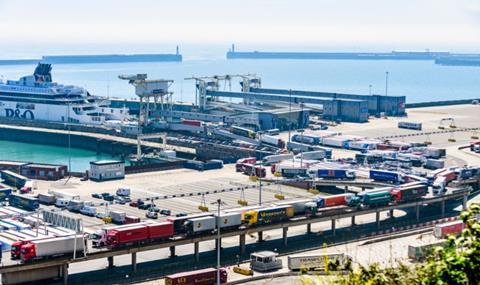
Operation Brock is set to be revived as part of government plans to cope with post-Brexit queues at the Channel Ports.
The move to relaunch Operation Brock is contained in a consultation document published this week which acknowledges that there could be border queues created by the UK’s exit from the EU in December, for at least the first six months of next year.
Mitigation plans proposed in the document include the relaunch of Operation Brock from December this year, which will allow up to 2,000 HGVs to be queued on the coastbound carriageway between junctions 8 and 9 of the M20 and at other holding areas in Kent - while non-port traffic bypasses the queue via a contraflow.
The document also singles out hauliers as liable to “exacerbate” queues by not being “border ready” with all the necessary border documentation.
It plans “to incentivise hauliers to ensure they are border-ready before setting off for the Short Straits by making use of the proposed Smart Freight Service” and punish those who do not have the right documentation with £300 fines and possible seizure of goods.
The document also proposes Kent Access Permits for hauliers, which will require drivers stick to designated routes and penalise those that do not comply.
Logistics UK, formerly FTA, slammed the proposals. Chris Yarsley, policy manager for road infrastructure said: “It is disappointing to see that the government is expecting significant friction at the border after the logistics industry had been given reassurances that friction would be minimised.
“Our members are dismayed that the onus for compliance will be placed on drivers themselves, leaving them personally liable for a fine if they do not comply with the new rules.
“The current proposals also create an internal UK border by introducing Kent Access Permits, adding more red tape to the work hauliers will be obliged to comply with.”
Logistics UK also questioned the readiness of the Smart Freight system.
Yarsley said: “It is unclear when Smart Freight will be ready and available for testing,” warning that members would be hard pressed to learn the new system by 1 January 2021, particularly during the peak season.
He added: “The current proposals leave too many questions unanswered and very little time available to identify and implement solutions to keep the country trading.”
In a statement accompanying the consultation, transport secretary Grant Shapps said: "Our underlying objective in all this work will be to enable trade in goods to continue to flow smoothly between the UK and the EU.
"But this will be an important moment of change, and there is at least initially a risk of some additional friction at the border – notably if goods arrive without having completed the necessary customs and other processes.
"It is thus important that we put in place plans both to minimise the risk of disruption and to mitigate its impact should it occur. And we need of course to have a particular focus in that context on the Short Straits, given the volume of traffic that moves both on the ferries leaving Dover and through the Channel Tunnel.”
The consultation period began on 3 August and runs until midnight on August 23.
Responses should be sent to OperationBrockSIs@dft.gov.uk with your views.
The consultation document can be found here: https://www.gov.uk/government/consultations/enforcing-operation-brock-plans-in-2021/proposed-legislative-amendments-on-enforcing-operation-brock#executive-s










